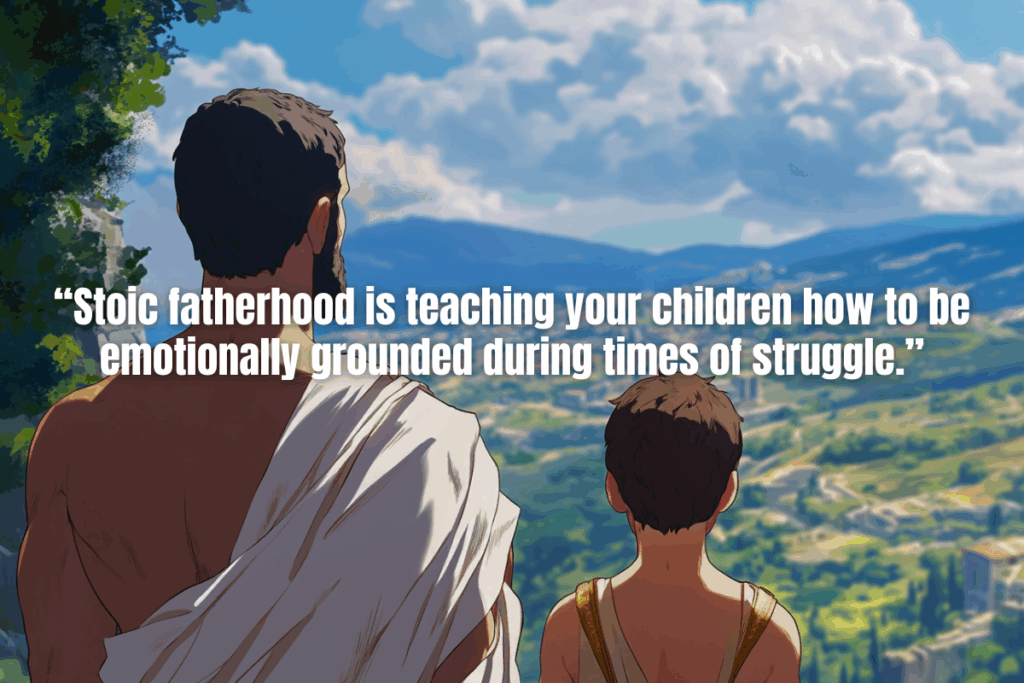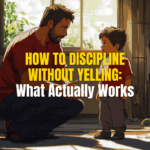Stoic fatherhood isn’t about being emotionless, it’s about being emotionally grounded. It’s about showing up with clarity, discipline, and calm in a world that constantly pulls fathers toward chaos and reactivity. And perhaps most importantly, it’s about modeling a mindset that helps raise emotionally strong, resilient children. This is especially important when you are teaching your kids how to be emotionally grounded. It takes patience for them, and you!
In today’s fast-paced, overstimulated world, raising emotionally strong kids has never been more vital or more challenging. As fathers, we’re often tempted to shield our kids from discomfort, fix their problems quickly, and push away hard feelings. But what if the greatest gift we can offer isn’t protection from adversity, but the tools to navigate it with grace?
That’s where the Stoic father comes in.
The Roots of Stoicism
Stoicism is a philosophy born in ancient Greece around the 3rd century BCE. Founded by Zeno of Citium and refined by philosophers like Epictetus, Seneca, and Marcus Aurelius, Stoicism teaches that while we can’t control external events, we can always control our reactions. It calls for self-discipline, rational thinking, and the pursuit of virtue, not comfort or ease.
These ancient lessons still resonate today, especially for modern fathers. Stoic fatherhood is about staying steady in the storm, not because we’re indifferent, but because our children need a model of strength rooted in inner calm. Stoicism isn’t about always being unshakable, us fathers are humans afterall. It’s working on improving how you react to the day to day challenges. So hopefully you have more positive days than bad
Why Stoic Fatherhood Matters
Parenting pulls on every part of us emotionally, mentally, physically. Without a grounded mindset, it’s easy to get swept up in frustration, guilt, or exhaustion. Stoic fatherhood gives men a powerful framework to navigate those emotions and become leaders their children can rely on.
It doesn’t mean we don’t feel. It means we don’t let feelings govern us. Stoic dads lead with presence, not panic. We listen before we react. We repair after we fall short. We hold space for our kids without being consumed by their storms.
And when we model this mindset, we give our children something far more valuable than comfort, we give them resilience. That’s needed more than ever these days!

How Stoic Fatherhood Builds Emotional Strength in Kids
Children learn how to be by watching how we are. When we live out Stoic principles, our kids internalize them. They start to build their own emotional foundations based on what they consistently see.
Here’s how Stoic fatherhood helps raise emotionally strong children:
- Emotional Regulation: When we practice staying calm under pressure, our children learn that big feelings don’t have to equal big reactions. But also when they do, they can learn how to navigate them better.
- Acceptance of Discomfort: Stoicism teaches that discomfort is part of life — not something to run from. Kids who understand this grow into more resilient adults.
- Reflective Thinking: Journaling, solitude, and mindful pauses are Stoic habits that help kids process rather than suppress their feelings.
- Focus on Control: Teaching kids to focus on what they can control reduces helplessness and encourages action-oriented thinking. This is real power for your kids!
- Character Over Comfort: Stoic fatherhood encourages values like courage, justice, and temperance, giving kids a strong moral compass.
Practical Applications of Stoic Fatherhood
You don’t need to be a philosopher to live Stoic fatherhood. You just need to practice small, intentional behaviors:
- Pause Before You React: Even one deep breath can shift the tone of an entire moment.
- Share Your Growth: Talk to your kids about your own struggles, your attempts to stay calm, and what you’re learning.
- Encourage Reflection: Create quiet moments — even five minutes a day — to sit, think, or journal together.
- Reframe Mistakes: Normalize failure. Show your kids that falling short is part of becoming stronger.
- Use Stoic Phrases: Simple lines like “Let’s focus on what we can control” or “This feeling will pass” can rewire how kids approach challenges.
- Be Present, Not Perfect: Put your phone down. Make eye contact. Let them feel seen. That’s what lasts.
The Legacy of a Stoic Father
Stoic fatherhood leaves a mark that doesn’t fade. It creates a home where emotions are safe but not overwhelming. A space where discipline and love work hand in hand. And a lasting impression that teaches kids how to navigate their own lives with grace and grit.
The emotionally strong child is not the one who never cries — it’s the one who knows how to feel without being consumed. Who can name what they feel, take ownership of their actions, and meet life’s difficulties with courage.
And behind that kind of child, more often than not, is a parent who lived with intention. A parent who didn’t need to raise their voice to be heard. A parent who modeled steadiness when the world around them was loud.
That’s the Stoic father. That’s the legacy.
If you want some more resources on Stoicism and modern fatherhood, definitely check out The Daily Dad.





